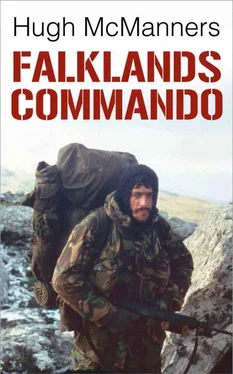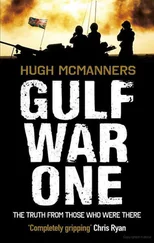Hugh McManners - Falklands Commando
Здесь есть возможность читать онлайн «Hugh McManners - Falklands Commando» весь текст электронной книги совершенно бесплатно (целиком полную версию без сокращений). В некоторых случаях можно слушать аудио, скачать через торрент в формате fb2 и присутствует краткое содержание. Город: London, Год выпуска: 2014, ISBN: 2014, Издательство: Nightstrike Publishing, Жанр: nonf_military, Биографии и Мемуары, на английском языке. Описание произведения, (предисловие) а так же отзывы посетителей доступны на портале библиотеки ЛибКат.
- Название:Falklands Commando
- Автор:
- Издательство:Nightstrike Publishing
- Жанр:
- Год:2014
- Город:London
- ISBN:978-0-992-81540-0
- Рейтинг книги:4 / 5. Голосов: 1
-
Избранное:Добавить в избранное
- Отзывы:
-
Ваша оценка:
- 80
- 1
- 2
- 3
- 4
- 5
Falklands Commando: краткое содержание, описание и аннотация
Предлагаем к чтению аннотацию, описание, краткое содержание или предисловие (зависит от того, что написал сам автор книги «Falklands Commando»). Если вы не нашли необходимую информацию о книге — напишите в комментариях, мы постараемся отыскать её.
Falklands Commando — читать онлайн бесплатно полную книгу (весь текст) целиком
Ниже представлен текст книги, разбитый по страницам. Система сохранения места последней прочитанной страницы, позволяет с удобством читать онлайн бесплатно книгу «Falklands Commando», без необходимости каждый раз заново искать на чём Вы остановились. Поставьте закладку, и сможете в любой момент перейти на страницу, на которой закончили чтение.
Интервал:
Закладка:
They also brought the sad news that Captain John Hamilton had been killed when his four-man patrol had been discovered in an OP near Port Howard. I’d met John a year or so earlier on the combat survival course at Hereford. He had a great love of mountains and an almost mystical interest in exploring the outer limits of his own endurance. He’d lived for some time next door to me on Intrepid, and his quiet sense of humour and gentle manner had helped in those anxious early days.
The manner of his death, surrounded by enemy, gravely wounded and giving covering fire to allow the other ‘brick’ (one pair in his four man patrol) to get away, and then his own ‘oppo’ to escape, was entirely in the character of the man. Like every one of our team leaders, I’d brooded long and hard about what we might do if one of our patrols went wrong. John did what I hoped I might have the courage to do if the nightmare of compromise and ambush had happened to us. I very much liked him.
D Squadron also brought us some even more disturbing news, delivered to us in true SAS style.
A voice from the darkness: “Hello lads, is Captain McManners around?”
Then: “Hi Boss. How’s the Butcher of Beagle Ridge then?”
We didn’t laugh, and once the newcomers realised we hadn’t a clue what they were talking about, their mickey-taking stopped. Just as well, as we wouldn’t have put up with it for long once we did find out what they were talking about.
It seemed that on one of the previous nights, naval shells had killed several civilians in the town. The information was simply that, with the possibility that two of them were women. This very upsetting news was not something we could joke about in order to reduce its impact, but equally was not something we could afford to let get the better of us, so we simply tried to forget about it. Also it might not actually be true.
In fact, very sadly, it was all too true.
Swiftly an Argentine communiqué was issued:
Communiqué 150. The Joint Chiefs of the General Staff communicate that yesterday, 11 June 1982, English forces began an indiscriminate bombardment of the town of Puerto Argentino, killing two women, aged 46 and 30, and wounding another two, aged 30 and 35 respectively, and two men of 32 and 35 years. All those concerned are residents of the islands (Kelpers) who were surprised in their homes by the naval bombardment.
In relation to the event described, those Joint Chiefs of the General Staff point out with particular emphasis that, during all the naval bombardments performed by the English forces until now, the civilian population, who in this case were converted into a priority target, have never been attacked.
It must be stated that modern firing systems that the enemy employs, as well as his training and experience, eliminate the possibility that what happened could have been an error.
This attack, executed against innocent civilian townspeople, together with that carried out by English aircraft on the hospital ship Bahia Paraiso draw grave attention to the lack of respect for human rights shown by Great Britain, an attitude that leaves no doubt in constituting an affront to the western world.
All the above is in visible contrast to the performances of the Argentinean forces who have acted throughout with maximum restraint and humanity, as is proved by the fact they took the islands without producing casualties among the English forces and the inhabitants, nor damaging their goods and properties.
Communiqué 153…. English naval units…… the following casualties:
Killed:
Susan Whitley : Aged 30 – British citizen.
Doreen Boner : Aged 46 – Citizen of the Malvinas, born 24/10/35. Passport No. 323490
Wounded:
Mary Goodwin: Aged 82 – Citizen of the Malvinas – very serious.
Veronica Fowler : Aged 38 – married – teacher – British citizen born Scotland 18/10/44
John Fowler: Aged 39 – father of two children: Rachel aged two and another born recently – seriously wounded.
Steve Whitley : Aged 35 – British citizen – Superintendent of Education – seriously wounded.
The health services in the zone are doing their utmost in their efforts to save the lives of the four wounded people.
These citizens, British and Malvinenses, killed and wounded by British weaponry, are the very same that the British government is claiming to protect and in defence of those whose interest it says it is waging this struggle for a land that it had usurped and therefore doesn’t belong to it.
The next day, 13 June, the Ministry of Defence announcement had been made:
“Argentine sources have reported that two civilians were killed and four injured during the course of recent hostilities around Port Stanley. We cannot be certain about these reports but sadly there is some evidence that they are true.” [14]
Since I controlled all the shelling around Port Stanley, the airfield and the hills to the west and north, it was definitely one of ‘my’ shells, which was deeply upsetting.
But there were serious practical implications. When we received this news – based just on the one-sentence MoD statement, it was not possible for me on Beagle Ridge to decide exactly on which night the tragedy had happened. The peculiarities of our first night’s shooting (11/12 June) seemed the most likely. The shells had not fallen as we’d expected, and when I’d told the ship to check their system they’d been unable to find anything wrong. In the process, I’d ‘lost’ several shells in dead ground which should have landed well away from any houses.
But if the tragedy had not occurred on that night, then I was extremely worried. Every other shoot we’d done had seemed to go really well. I simply could not afford to have any doubts.
Once hostilities ended, 148 Battery were to gather on HMS Fearless . Our Battery Sergeant Major Jock Malcolm, who’d been the liaison officer on board the gunship on that first night, made a point of telling me what happened. He said that when the firing system had been checked, nothing was amiss and they assumed I was mistaken. I’d then told them to ‘Check Solution’ a second time, and an impasse was reached when still they could find nothing wrong. At this stage I terminated the shoot and ordered them to leave the gunline.
The next day, worried by my insistence, the gunnery crew made a complete check of the computers and firing system. They discovered a small deviation on one of the tracking radars, on the ‘Beacon MIP’, that would produce exactly the error I’d estimated the night before. To be proved correct after the event was a small comfort, but I was very grateful to have been told.
Such a comprehensive systems check would not have been possible on the night of the firing. On the gunline, a few miles off Port Stanley, the gunship was well within range of the land-based Exocets. (Later that same night, HMS Glamorgan had been hit by one of two Exocets launched from Stanley while taking a short-cut back to the fleet). All the ship’s company were fully occupied with gunnery and the defence of the ship. They were over a hundred miles from the safety of the Task Force and its integrated defence of missile-carrying destroyers and carriers. It was the conscientiousness of the crew, checking in spite of believing themselves to be right, that unearthed the fault, hidden away in the complexity of the computer system.
It was a tragedy, part of the comprehensive tragedy of war.
Up on Beagle Ridge in the biting wind, this nightmare seemed yet another sadness to have to absorb. The SAS reinforcements, fresh from Sir Lancelot , who’d brought the bad news, had no details other than that two or possibly three civilians had been killed. I swore a bit. Then I carried on with the job. It had happened and there was nothing I could do about it. The only response was to do as best we could to get the whole cruel business over with as fast as possible.
Читать дальшеИнтервал:
Закладка:
Похожие книги на «Falklands Commando»
Представляем Вашему вниманию похожие книги на «Falklands Commando» списком для выбора. Мы отобрали схожую по названию и смыслу литературу в надежде предоставить читателям больше вариантов отыскать новые, интересные, ещё непрочитанные произведения.
Обсуждение, отзывы о книге «Falklands Commando» и просто собственные мнения читателей. Оставьте ваши комментарии, напишите, что Вы думаете о произведении, его смысле или главных героях. Укажите что конкретно понравилось, а что нет, и почему Вы так считаете.












